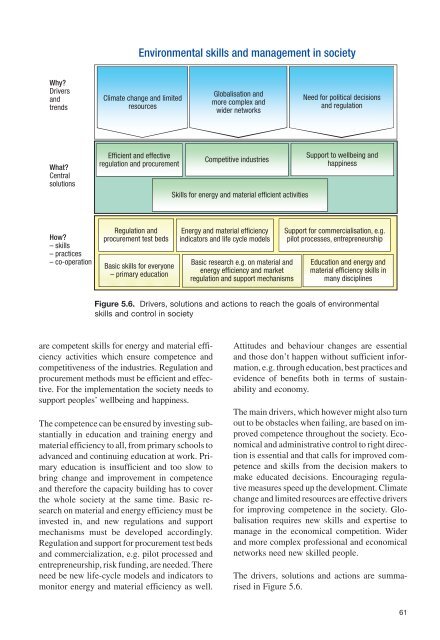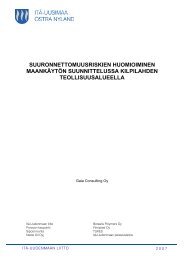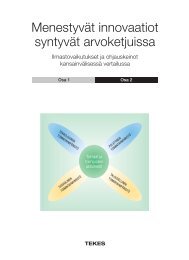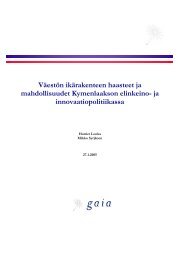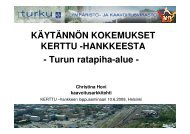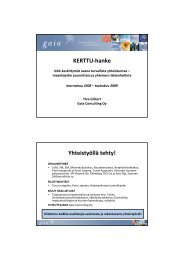227/08 Social challanges s the basis for foresight - Gaia
227/08 Social challanges s the basis for foresight - Gaia
227/08 Social challanges s the basis for foresight - Gaia
You also want an ePaper? Increase the reach of your titles
YUMPU automatically turns print PDFs into web optimized ePapers that Google loves.
Why?<br />
Drivers<br />
and<br />
trends<br />
What?<br />
Central<br />
solutions<br />
How?<br />
– skills<br />
– practices<br />
– co-operation<br />
are competent skills <strong>for</strong> energy and material efficiency<br />
activities which ensure competence and<br />
competitiveness of <strong>the</strong> industries. Regulation and<br />
procurement methods must be efficient and effective.<br />
For <strong>the</strong> implementation <strong>the</strong> society needs to<br />
support peoples’ wellbeing and happiness.<br />
The competence can be ensured by investing substantially<br />
in education and training energy and<br />
material efficiency to all, from primary schools to<br />
advanced and continuing education at work. Primary<br />
education is insufficient and too slow to<br />
bring change and improvement in competence<br />
and <strong>the</strong>re<strong>for</strong>e <strong>the</strong> capacity building has to cover<br />
<strong>the</strong> whole society at <strong>the</strong> same time. Basic research<br />
on material and energy efficiency must be<br />
invested in, and new regulations and support<br />
mechanisms must be developed accordingly.<br />
Regulation and support <strong>for</strong> procurement test beds<br />
and commercialization, e.g. pilot processed and<br />
entrepreneurship, risk funding, are needed. There<br />
need be new life-cycle models and indicators to<br />
monitor energy and material efficiency as well.<br />
Environmental skills and management in society<br />
Climate change and limited<br />
resources<br />
Efficient and effective<br />
regulation and procurement<br />
Regulation and<br />
procurement test beds<br />
Basic skills <strong>for</strong> everyone<br />
– primary education<br />
Globalisation and<br />
more complex and<br />
wider networks<br />
Competitive industries<br />
Skills <strong>for</strong> energy and material efficient activities<br />
Energy and material efficiency<br />
indicators and life cycle models<br />
Basic research e.g. on material and<br />
energy efficiency and market<br />
regulation and support mechanisms<br />
Need <strong>for</strong> political decisions<br />
and regulation<br />
Support to wellbeing and<br />
happiness<br />
Support <strong>for</strong> commercialisation, e.g.<br />
pilot processes, entrepreneurship<br />
Education and energy and<br />
material efficiency skills in<br />
many disciplines<br />
Figure 5.6. Drivers, solutions and actions to reach <strong>the</strong> goals of environmental<br />
skills and control in society<br />
Attitudes and behaviour changes are essential<br />
and those don’t happen without sufficient in<strong>for</strong>mation,<br />
e.g. through education, best practices and<br />
evidence of benefits both in terms of sustainability<br />
and economy.<br />
The main drivers, which however might also turn<br />
out to be obstacles when failing, are based on improved<br />
competence throughout <strong>the</strong> society. Economical<br />
and administrative control to right direction<br />
is essential and that calls <strong>for</strong> improved competence<br />
and skills from <strong>the</strong> decision makers to<br />
make educated decisions. Encouraging regulative<br />
measures speed up <strong>the</strong> development. Climate<br />
change and limited resources are effective drivers<br />
<strong>for</strong> improving competence in <strong>the</strong> society. Globalisation<br />
requires new skills and expertise to<br />
manage in <strong>the</strong> economical competition. Wider<br />
and more complex professional and economical<br />
networks need new skilled people.<br />
The drivers, solutions and actions are summarised<br />
in Figure 5.6.<br />
61


